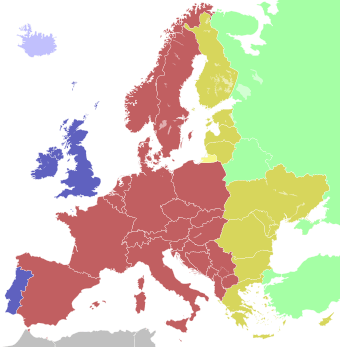Time in Germany facts for kids
Imagine you're talking to a friend in another country. If it's daytime for you, it might be night for them! This is because of time zones. A time zone is a region that uses the same standard time. Germany, like many countries, uses a specific time zone.

| blue | Western European Time (UTC+0) Western European Summer Time (UTC+1) |
| light blue | Western European Time (UTC+0) |
| red | Central European Time (UTC+1) Central European Summer Time (UTC+2) |
| yellow | Eastern European Time (UTC+2) Eastern European Summer Time (UTC+3) |
| orange | Kaliningrad Time (UTC+3) |
| green | Further-eastern European Time (UTC+3), a.k.a. Moscow Time |
Contents
Time in Germany
Germany uses two main time settings throughout the year. For most of the year, it observes Central European Time (CET). During the warmer months, it switches to Central European Summer Time (CEST). This change helps make the most of daylight.
Central European Time (CET)
Central European Time (CET) is the standard time used in Germany during autumn and winter. In German, it's called Mitteleuropäische Zeit (MEZ). CET is one hour ahead of Coordinated Universal Time (UTC). We write this as UTC+01:00. This means if it's 12:00 PM UTC, it's 1:00 PM in Germany.
Central European Summer Time (CEST)
During spring and summer, Germany switches to Central European Summer Time (CEST). This is also known as Mitteleuropäische Sommerzeit (MESZ) in German. CEST is two hours ahead of Coordinated Universal Time (UTC). We write this as UTC+02:00. So, if it's 12:00 PM UTC, it's 2:00 PM in Germany during summer.
What is Daylight Saving Time?
The switch between CET and CEST is part of something called Daylight saving time (DST). The main idea behind DST is to use the daylight hours more efficiently. By moving the clocks forward in spring, evenings have more daylight. This can save energy and give people more time for outdoor activities.
When Does the Time Change?
In Germany, Daylight Saving Time starts on the last Sunday in March. At 2:00 AM CET, clocks jump forward one hour to 3:00 AM CEST. This means you "lose" an hour of sleep that night!
Daylight Saving Time ends on the last Sunday in October. At 3:00 AM CEST, clocks move back one hour to 2:00 AM CET. This means you "gain" an hour of sleep. It's like a bonus hour for your weekend!
 | Georgia Louise Harris Brown |
 | Julian Abele |
 | Norma Merrick Sklarek |
 | William Sidney Pittman |

